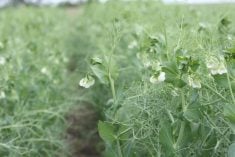Research project at the U of M will receive $7.6 million in funding to explore how net-zero farming can be made realistic
Glacier FarmMedia – The University of Manitoba is getting $7.6 million in federal funds to study net-zero farming systems.
The Sustainable Agriculture Initiative Grant will be disbursed over four years and aims to identify strategies to support the Canadian agricultural sector as it moves to a net-zero economy.
The federal government has established a goal to reach net-zero greenhouse gas emissions in the next 26 years.
Read Also

New coal mine proposal met with old concerns
A smaller version of the previously rejected Grassy Mountain coal mine project in Crowsnest Pass is back on the table, and the Livingstone Landowners Group continues to voice concerns about the environmental risks.
U of M researcher Martin Entz, best known for his work on organics, is the project lead.
“This is a huge amount of money. It’s certainly the largest grant that I’ve ever been involved in,” he said. “I think it demonstrates that the funders are very serious about wanting to leverage the expertise that exists.”
Entz and his team will work with stakeholders from agriculture, conservation groups, First Nations and academia to study agricultural sustainability, identify gaps and track the progress of emission reductions.
Net-zero farming, and how to feasibly reach that goal while protecting farm productivity and profitability, is a common conversation as the agriculture sector wrestles with its fit in Canada’s aim to be net zero by 2050.
“We’ve had a lot of monoculture, a lot of overgrazing, and farm policy that is not really focused on biodiversity, and that ignores Indigenous voices in agriculture, even though Indigenous communities own a lot of land,” said Entz.
The project is called LEAP: Leveraging Ecosystems to transform Agriculture on the Prairies. The acronym is not incidental.
“Most of our other research is very incremental, increasing the efficiency by two or three per cent. When we look at the challenges on the planet, we do need some efforts that are bolder than two or three per cent,” said Entz.
He and his team began considering the pieces already in place and how they could be put into a research project that combines expertise in different fields and also builds on what farmers have already done.
“Farmers are probably more interested in talking about soil health than they are about global warming. And that’s fine. That’s a unifying thing,” said Entz. “We know that there are a lot of farmers who have really innovated on their farms and have made that leap.”
The team is turning to the few farmers who have achieved net zero by using a suite of best management practices. Questions remain on how to replicate and incorporate what these farms are doing at scale.
Entz said they are using made-in-Canada modelling software called HOLOS to answer that question. The software application was developed by Agriculture Canada and can be used to estimate how changes to Canadian farming systems would impact greenhouse gas emissions and changes in soil carbon.
“We can’t do field research on every little thing on every little farm. This allows us to test those farmer ideas in what we call the co-design process.”
The team is also engaging with industry partners including Keystone Agricultural Producers, the National Farmers Union and Ducks Unlimited Canada to learn about sustainable agriculture initiatives and how to work with such organizations to inform policy.
Michelle Carkner, the project’s director of research and partnerships, said those policy-focused groups were contacted while the team was putting its funding proposal together. The team wanted to understand the challenges of taking ideas like sustainable agriculture and net zero and implementing them with farmers.
“A lot of them said they just didn’t have well-rounded data on these alternative management systems,” said Carkner.
Engagement of First Nation communities is an important aspect of LEAP. Kyle Bobiwash is an assistant professor and Indigenous scholar in the entomology department. He heads the First Nations engagement working group.
Bobiwash said First Nations communities have always been interested in agriculture but impediments such as provincial and federal funding mechanisms and private land ownership have limited their engagement.
“All that beautiful farmland in Saskatchewan that is part of reserve communities is often leased because, to them, that’s the easiest way to make a little bit of profit,” he said. “But if we want to develop that market, develop the profitability of that land, and think about it in terms of conservation, climate and food security, it’s going to require really diverse skill sets and tool sets.
“I see this as a really fantastic connector that has just been lost or a little bit neglected based on just how we’ve historically done agricultural business.”


















